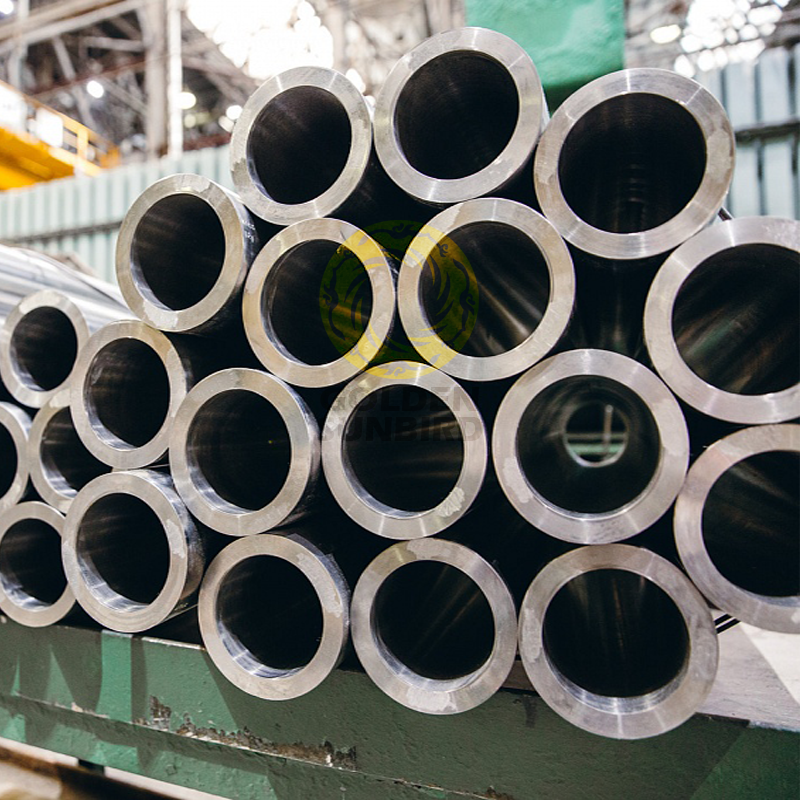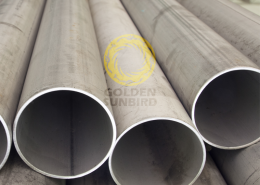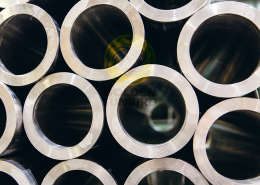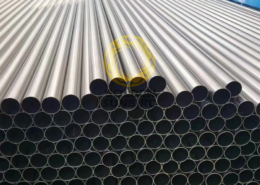ASTM B394 Niobium and Niobium Alloy Tube
- Type: Seamless and Welded Tube
- R04200-Type 1—Reactor grade unalloyed Niobium.
- R04210-Type 2—Commercial grade unalloyed Niobium.
- R04251-Type 3—Reactor grade Niobium alloy containing 1 % Zirconium.
- R04261-Type 4—Commercial grade Niobium alloy containing 1 % Zirconium.
Features
ASTM B394/B394M Seamless and Welded Niobium and Niobium Alloy Tube
R04200-Type 1—Reactor grade unalloyed niobium.
R04210-Type 2—Commercial grade unalloyed niobium.
R04251-Type 3—Reactor grade niobium alloy containing 1 % zirconium.
R04261-Type 4—Commercial grade niobium alloy containing 1 % zirconium.
Chemical Composition (wt.%) of Seamless and Welded Niobium and Niobium Alloy Tube
| Element/Property | Type 1 (R04200) | Type 2 (R04210) | Type 3 (R04251) | Type 4 (R04261) |
| Carbon (C) | Max 0.01% | Max 0.01% | Max 0.01% | Max 0.01% |
| Nitrogen (N) | Max 0.01% | Max 0.01% | Max 0.01% | Max 0.01% |
| Oxygen (O) | Max 0.015% | Max 0.025% | Max 0.015% | Max 0.025% |
| Hydrogen (H) | Max 0.0015% | Max 0.0015% | Max 0.0015% | Max 0.0015% |
| Zirconium (Zr) | – | – | 0.8 to 1.2% (Range) | 0.8 to 1.2% (Range) |
| Tantalum (Ta) | Max 0.1% | Max 0.3% | Max 0.1% | Max 0.5% |
| Iron (Fe) | Max 0.005% | Max 0.01% | Max 0.005% | Max 0.01% |
| Silicon (Si) | Max 0.005% | Max 0.005% | Max 0.005% | Max 0.005% |
| Tungsten (W) | Max 0.03% | Max 0.05% | Max 0.03% | Max 0.05% |
| Nickel (Ni) | Max 0.005% | Max 0.005% | Max 0.005% | Max 0.005% |
| Molybdenum (Mo) | Max 0.010% | Max 0.020% | Max 0.010% | Max 0.050% |
| Hafnium (Hf) | Max 0.02% | Max 0.02% | Max 0.02% | Max 0.02% |
| Titanium (Ti) | Max 0.02% | Max 0.03% | Max 0.02% | Max 0.03% |
| Brinell Hardness | 90 (Avg), 105 (Max) | 125 (Avg), 150 (Max) | 125 (Avg), 140 (Max) | 135 (Avg), 150 (Max) |
Mechanical properties for Seamless and Welded Niobium and Niobium Alloy Tube
| Grade | Ultimate Tensile Strength (min) | Yield Strength (0.2% offset, min) | Elongation in 1-inch (25-mm) Gage Length (min) |
| Type 1 | 18,000 psi (125 MPa) | 10,500 psi (73 MPa) | 25% |
| Type 2 | 18,000 psi (125 MPa) | 10,500 psi (73 MPa) | 25% |
| Type 3 | 28,000 psi (195 MPa) | 18,000 psi (125 MPa) | 20% |
| Type 4 | 28,000 psi (195 MPa) | 18,000 psi (125 MPa) | 20% |
Technical Specifications
| Specification | Value |
| Standard | ASTM B394 Niobium and Niobium Alloy Tube |
| Grade | R04200-Type 1, R04210-Type 2, R04251-Type 3, R04261-Type 4 |
| Finish | Clean, bright finish, free of defects and surface imperfections |
| Seam Type | Seamless and Welded |
| OD | 4.7-101.6mm |
| WT | 0.5-20mm |
| Length | 100-6000mm |
| Inspection Certificate | EN 10204 Type 3.1 (Mill Test Certificate), EN 10204 Type 3.2 (Witness Testing or 3rd Party Inspection) |
| Tests | Chemical analysis, Tensile test, Hardness test, and Microstructural examination |
Packing
Packed in plywood boxes.
Application
Heat Exchangers and Condensers: Niobium tubes are used in heat exchangers and condensers for corrosive chemical environments due to their excellent corrosion resistance.
Reactors and Vessels: Employed in reactors and vessels for handling aggressive chemicals, acids, and high-purity fluids.
Rocket Nozzles and Thrusters: Niobium’s high-temperature strength and resistance to oxidation make it suitable for rocket engine components.
High-Temperature Structures: Used in aircraft and spacecraft components exposed to extreme temperatures.
Nuclear Reactor Components: Niobium’s low neutron capture cross-section and corrosion resistance make it suitable for fuel cladding, control rods, and other reactor components.
Particle Accelerators: These are used in superconducting magnets and other components of particle accelerators.
Implants: Niobium’s biocompatibility makes it suitable for medical implants, such as pacemakers and bone screws.
Surgical Instruments: Used for specialized surgical instruments requiring corrosion resistance and high strength.
Superconducting Magnets: Niobium-titanium alloys are widely used for MRI machines, particle accelerators, and other scientific instruments in superconducting magnets.
Superconducting Cables: Employed in superconducting power cables for efficient electricity transmission.
Chemical processing plant heat exchangers: Niobium tubes resist corrosion from aggressive chemicals, ensuring long service life and preventing contamination of process fluids.
Nuclear reactor fuel cladding: Niobium tubes protect nuclear fuel rods from corrosion and prevent the release of radioactive materials into the coolant.
Superconducting magnets for MRI machines: Niobium-titanium alloy tubes create the superconducting coils that generate the strong magnetic fields required for MRI imaging.








